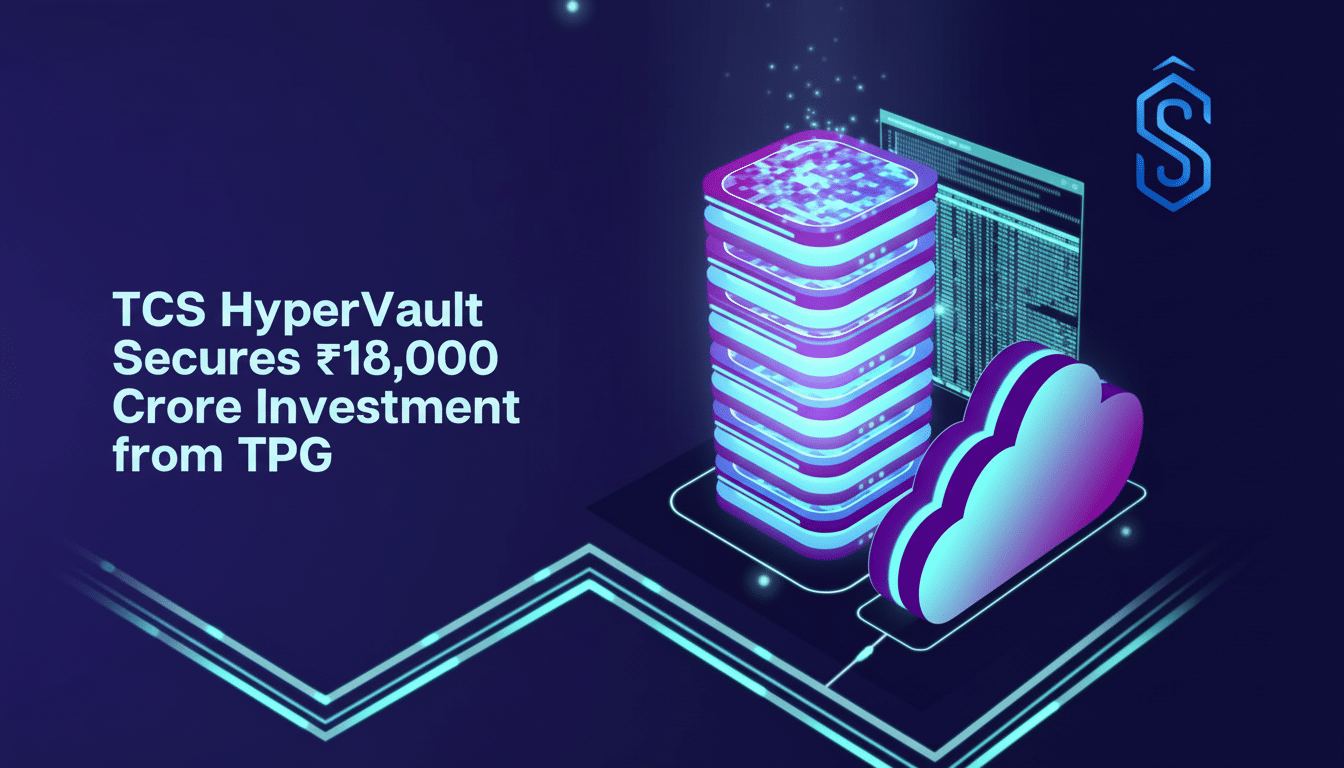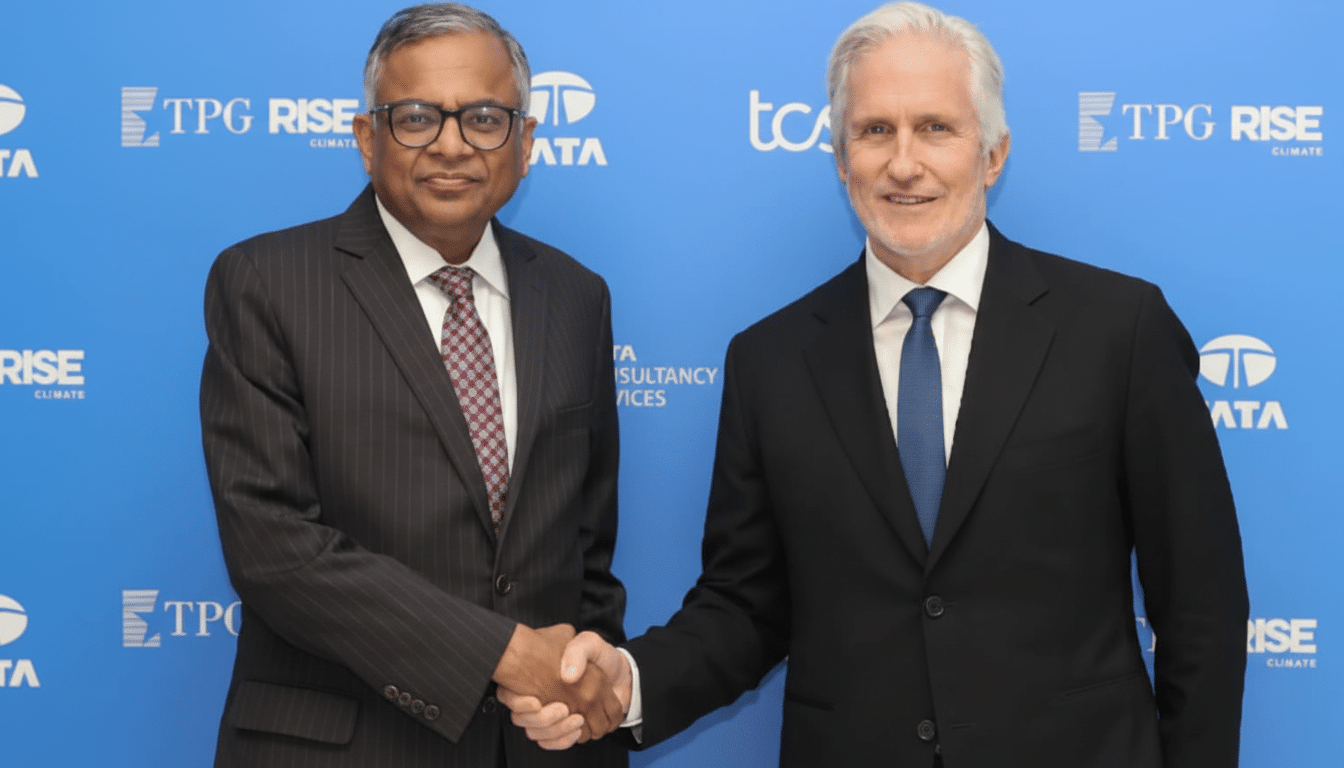Tata Consultancy Services has lined up $1 billion from TPG to help co-fund a planned $2 billion buildout of “HyperVault,” a network of gigawatt-scale, AI-accelerated data centres for India. The multiyear program targets deploying liquid-cooled, high-density AI training and inference centres at scale.
TCS is going to collaborate with hyperscalers and artificial intelligence companies to create, bring to life, and operate the platform, where about 1.2 gigawatts would be focused in the first phase. The move comes as India grapples with a compute deficit: the country churns out about 20% of the world’s data but has only about 3% of global data center capacity, a mismatch that is crimping AI uptake.

Why the TPG-TCS data center funding deal matters now
TPG’s commitment effectively marks deep-pocketed private capital becoming aggressive about investing in AI infrastructure, where slow payback periods and high upfront power, land, and equipment costs have inhibited builds. S&P Global reports that more than 95% of India’s new capacity in the next five years will be available for lease, with dedicated hyperscale AI sites taking up the rest – but this trend only underscores why anchor financings and operator credibility are all-important.
HyperVault is a premium right-sized platform for TCS that, as the world’s second largest solutions and services provider, already manages large global technology estates: HyperVault therefore becomes a classic platform play; own or control the compute fabric and “price up” integration, managed services & compliance.
Sites are likely going to fan out from established hotspots such as Mumbai, Bengaluru, and Chennai, as well as emerging coastal areas that have either state-of-the-art fiber connectivity or subsea cable landings.
Inside HyperVault’s design for AI-ready data centers
The infrastructure will be heavily weighted toward liquid cooling and dense rack designs that can support GPU-heavy clusters to drive next-gen artificial intelligence.
That efficiency brings trade-offs. The Uptime Institute, as reported by S&P Global, says a 1-megawatt data center load can require up to 25.5 million liters of water per year for cooling — no small amount in metros that are already water-stressed. Operators are moving toward closed-loop liquid cooling, heat reuse, and air-side economization to decrease withdrawals and overall water use.

Power is the other bottleneck. AI halls with high DPUs need stable, large-scale electricity and fast interconnects. Industry analysts attribute the trend to a cocktail of long-term renewable power purchase agreements (PPAs) under India’s Green Open Access mechanism (GOA), grid upgrades, and on-site storage to firm up intermittent supply. As operational expenses outweigh initial investment, tech and real estate are now driven by sustainability; thermal storage, battery systems, and advanced energy management are being integrated into ever-more AI campus designs to meet uptime objectives while minimizing environmental impact.
India’s AI infrastructure race and the rush to add capacity
Both global and local players are flooding in: S&P Global counts more than 32 billion dollars in announced data center investments in India over the last two years. Microsoft has announced $3 billion set aside for cloud and AI, Google intends to invest $15 billion in a gigawatt-scale AI hub in Andhra Pradesh, and Amazon declared earlier this year that it intends to spend $12.7 billion by 2030 on infrastructure for AWS. Indian domestic groups including Reliance Industries and CtrlS are building aggressively too.
TCS and TPG estimate that India’s total capacity could exceed 10 gigawatts by 2030, from about 1.5 gigawatts now. Growth in the pace will be contingent on power tie-ups, land acquisition, as well as the availability of high-end AI chips that are still a global supply constraint despite increasing production and diversified supply chains.
What enterprises need to know about local AI capacity
For banks, telecoms, healthcare networks, and public-sector entities in particular, greater local AI capacity translates to less latency (because data doesn’t have as far to travel), stronger data-residency guarantees, and potentially better cost-performance than sending workloads abroad. The facilities will be designed to meet India’s data security requirements and reduced latency for sensitive sectors and geographic requirements, in line with India’s regulations.
TCS can package migration, model training environments, and managed inference at scale into a multi-cloud and hybrid environment. Look for tightly integrated networking fabrics, high-throughput storage, and observability layers tailored for AI pipelines — features that can cut time-to-value for developers and data science teams.
The road ahead for TCS and TPG’s HyperVault buildout
With TPG funding half the programme, TCS has, to a large extent, de-risked a significant portion of capex and indicated its intention to be a key AI infrastructure provider in India. Among the key deadlines to watch out for: site selections, renewable power agreements, water and cooling strategies, and early tenant signings. With execution from the partners, HyperVault could seriously squeeze India’s compute gap and be a blueprint for scaled and sustainable AI campuses in high-growth markets.

